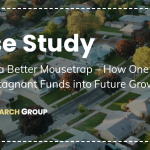In just the past three days, stock markets have suffered major losses. The Dow dropped by over 3,000 points, the S&P 500 fell nearly 9%, and the Nasdaq saw one of its steepest declines in 25 years. It is the kind of movement that makes even the most confident Wall Street trader and HOA board members wonder: What should we be doing with our reserve funds right now?
Whether your community association manages $100,000 or $100 million in reserves, sharp market declines—what some call “meltdowns”—can trigger stress, concern and what do we do TODAY. But volatility is not new. Understanding how to plan around it, not just reacting to it, is the key to long-term financial health.
What Is a Market Meltdown, Really?
A “market meltdown” typically refers to a rapid and significant drop in financial markets, often caused by fear, uncertainty, or unexpected events. The cause might be inflation reports, interest rate changes, geopolitical tensions, or financial system disruptions, like tariffs.
These events are unpredictable. But their impact can be planned for.
Community associations, unlike individual investors, have specific financial responsibilities: maintaining buildings, repairing infrastructure, funding capital improvements. Their investment horizon is usually longer—but not infinite—and their tolerance for loss is understandably low. That is why short-term market drops can feel disproportionately stressful.
Lesson 1: Volatility Is Normal—but Planning Is Essential
Every few years, markets experience a correction—a drop of 10% or more. Major declines, like those in 1999, 2008 or 2020, tend to happen once or twice a decade. The key is not to panic, but to ask: How exposed are we to this kind of movement?
Here are some helpful questions for any board to ask during periods of volatility:
- Do we know when we will need to access our reserve funds—and how much?
- Are our current investments aligned with those timelines?
- Are we invested based on past decisions, or a current plan?
- Do we understand our tolerance for short-term losses in service of long-term growth?
If you do not know the answers—or if it has been a few years since you last asked—this is a good time to revisit your investment structure or contact an advisor with decades of experience.
Lesson 2: Managing Reserves Is Not Just About Returns
Many community boards focus on safety and yield—and they should. But financial health is not just about what you earn. It is about how well your funds are aligned with your obligations. That is the core idea behind Asset and Liabilities Management (ALM)a framework that looks at both what you have and what you owe, now and in the future.
Here’s why ALM matters:
- A community with a roof replacement in 3 years should not have all its reserves tied up in long-term investments, no matter how attractive the return is.
- Conversely, a community with no major projects for 10 years may be losing purchasing power by keeping everything in cash.
By looking at both the timing and purpose of your future expenses, you can structure your reserve investments to provide the right combination of liquidity, safety, and yield. That is where a Structured Asset Management Systems® process comes into play.
Lesson 3: Market Declines Can Be a Useful Moment to Reassess
Rather than seeing a downturn as a time to retreat, consider it a time to reset.
- Revisit your Investment Policy Statement (IPS): Does it reflect your current goals, timelines, and risk tolerance?
- Evaluate cash flow assumptions: Have any major projects changed in cost or timing?
- Review liquidity needs: Are the funds you need in the next 1–3 years insulated from market swings?
- Do you have exposure to the volatile equity markets? Or are you shielded from volatility with relatively sheltered investment vehicles?
Think of it like recalibrating a GPS when road conditions change. The destination has not changed—but you might need a smarter route.
Lesson 4: It is Okay to Ask for Help
Managing reserves is not just about picking investments. It is about creating a plan that meets your community’s unique needs. That often means collaborating with professionals—whether they are investment advisors, property managers, or consultants—who can help you build a sustainable plan, not just chase a return.
If you are reviewing your strategy, here are some best practices to look for in any partner:
- A clear process driven approach that begins with your needs—not their products.
- Education and transparency, so your board understands each recommendation.
- Experience with communities like yours, especially navigating market uncertainty.
But even before you bring in outside help, it starts with asking the right questions internally.
Final Thoughts: Be Proactive, Not Reactive
The past few days have been a jolt—but not an uncommon one for those of us who have seen this before. These kinds of market movements are part of the investing cycle. The best time to build a financial plan was before the market dropped. The second-best time? Right now.
By grounding your community’s reserve strategy in timing, needs, and structure, not just headlines, you can reduce anxiety and increase confidence, even in the face of market uncertainty.
This is not about “playing the market.” It is about being wise stewards of your community’s long-term resources.
Helping You Build a Firm Financial Foundation For Your Future
Nico F. March is the Managing Director of The March Group, LLC. He has collaborated with Community Associations since 1974 and has served on several Boards, including the Board of Directors for the Community Association Institute (CAI), San Diego Chapter.
His team has specialized in Corporate Cash and Association Financial Management since 1982 and has assisted over one thousand Associations, Nonprofits and Timeshares invest reserve, operating, tax impound, SIRS and reconstruction funds. Nico and his team work out of their San Diego, Florida and Wyoming offices and may be reached at 888.811.6501 or email [email protected] for further information and consultations.
Content in this material is for general information only and not intended to provide specific advice or recommendations for any individual. All performance referenced is historical and there is no guarantee of future results. All indices are unmanaged and may not be invested into directly.
Securities and advisory services offered through LPL Financial, a registered investment advisor. Member FINRA/SIPC
LPL- 719990-01-01



